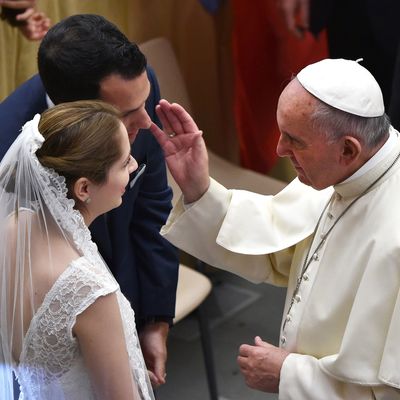
To call the media coverage on the left of Pope Francis’s U.S. visit a lovefest might be an understatement. But the mood chilled a few degrees when news broke that the pontiff met privately with Kim Davis. After a period of seeming disorientation, the past several days have given us the spectacle of liberal-leaning media outlets falling all over themselves to exonerate their beloved Pope Francis for having committed the sin of meeting privately with Davis.
Esquire wonders if the pope was “swindled” into meeting Davis, the Kentucky court clerk who as a matter of conscience has refused to issue same-sex marriage licenses. A Slate headline trumpets that the meeting was “not an endorsement.” A Huffington Post column calls it “a trap,” and the Times and many other news outlets — including this one — point out that the pope met with gay people, too. Now rumors out of the Vatican hint that the hapless archbishop who set up the meeting is about to be fired. The suggestion is that our hero Pope Francis could never have intended to meet the villain Kim Davis, because … well, Francis is way too cool for that.
In this fairy tale of good and evil, Kim Davis is the Christian-right bogeywoman who refuses to get in line with popular opinion and the law of the land. She is also — let’s face it — a perfect representative of the kind of white bumpkin the urbane left loves to disdain: overweight and unstylish and self-righteous, too, the kind of woman who probably wears elastic-waist pants to church. And Francis, as everyone knows, is the Liberal Prophet, an old white dude from the southern hemisphere who’s giving a fresh, provocative spin on a moribund church, a septuagenarian who preaches peace and love above all. In this framing, Francis is Just Like Us — a progressive thinker who hates inequality (and probably orders his beefsteak rare) — and Davis is the devil who hates true love (and definitely eats fried cheese).
But I submit that the left entirely deludes itself on Francis’s openness, thinking only what it wants and ignoring all evidence to the contrary. “Who am I to judge?” is what the pope said, off the cuff in 2013, when asked a question on the papal plane about gay priests. This is indeed a far more loving and accommodating response to the question of homosexuality than any pope has ever made, but a vote of support for the legalization of same-sex marriage — or even a hint that he believes that gay people and lesbians might someday be regarded as acceptable parents by the Roman Catholic Church — it most certainly is not. It reminds me of the old “hate the sin, love the sinner” line that Rick Warren used to use when he wanted to please opposing constituencies, to be at once a hardline Christian and a good guy, too. Part of the pope’s job is to be runic in one’s self-expression, and “Who am I to judge?” might even be interpreted in a negative light, along the lines of what one’s Jewish mother might say when one was making a choice of which she disapproved: “Sure, go to Florida with the rugby team over spring break. Who am I to judge?” More likely, though, the phrase was meant in its deepest Christian sense, which is to say to remind people that, according the Testaments both New and Old, humans don’t (ultimately) judge humans. Judgment is God’s job, and only God in his love and mystery knows who deserves to be sent to hell.
As the archbishop of Buenos Aires, Jorge Bergoglio fought hard against the legalization of same-sex marriage in 2010, sending a letter to four monasteries in Argentina urging them to pray that legislators do the right thing and vote the bill down. Here is what he said:
In the coming weeks, the Argentine people will face a situation whose outcome can seriously harm the family … At stake is the identity and survival of the family: father, mother and children. At stake are the lives of many children who will be discriminated against in advance, and deprived of their human development given by a father and a mother and willed by God. At stake is the total rejection of God’s law engraved in our hearts.
Let us not be naive: this is not simply a political struggle, but it is an attempt to destroy God’s plan. It is not just a bill (a mere instrument) but a ‘move’ of the father of lies who seeks to confuse and deceive the children of God.”
And in his speech to Congress, Francis reiterated this idea that same-sex marriage was a contributing factor in the downfall of the traditional family — though as pope he expressed his disapproval far more elliptically:
Yet I cannot hide my concern for the family, which is threatened, perhaps as never before, from within and without. Fundamental relationships are being called into question, as is the very basis of marriage and the family. I can only reiterate the importance and, above all, the richness and the beauty of family life.
At the risk of oversimplifying, we might say that we live in a culture which pressures young people not to start a family, because they lack possibilities for the future. Yet this same culture presents others with so many options that they too are dissuaded from starting a family.
By “fundamental relationships” Francis alludes here to his religion’s insistence that marriage is between one man and one woman, and by “so many options” the pope doubtless implicates all of the different ways modern Americans express themselves sexually and romantically: Professionally minded women, childless single people, childless couples, unmarried couples, and, yes, gay and transgender people — all of these contribute to the family’s demise.
Without a doubt, the meeting with Davis is a PR disaster, and the Vatican has tried over the past several days to roll it back, saying the encounter wasn’t private, Davis was in a receiving line, the meeting should not be interpreted as an endorsement of Davis’s position in its specifics. And, indeed, it’s hard to imagine that Francis himself (the public-relations savant) either follows U.S. news closely enough to know who Davis is, or is so tone-deaf that he would insist on extending her an invitation despite the inevitable backlash.
But it’s not at all hard to envision a scenario in which some Vatican functionary — who knows as well as Francis does that, to this day, the catechism regards homosexuality as “intrinsically disordered” and gay sex as an act of “grave depravity,” which cannot under any circumstances be approved — regarded Davis as heroic and lobbied to put her name on the select list of Americans offered meet-and-greets. The Vatican is a gigantic organization, in which right and left hands are not always in sync; not everyone, moreover, is as deft at walking ideological tightropes in public as the pope. But all of it — the reaction from the left, the damage control from Rome — is, in true Vatican style, really about appearances. Because on the substantive question of same-sex marriage, the pope and Kim Davis are — despite what the pope’s progressive fans might hope — likely very closely aligned.






























